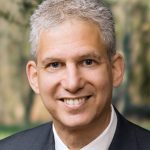It is likely uncommon to find a neurologist so interested in nutrition and how it affects brain function.
Dr. Lombard: I wrote The Brain Wellness Plan in 1996 with Carl Germano, CNS, CDN interventions for Alzheimer’s and other neurodegenerative diseases that are now regarded as being vitally important for prevention.
And so, do you apply functional medicine to your neurology practice?
Dr. Lombard: Functional medicine can most broadly be understood as the practical application of systems biology.
Neurologists are usually associated with physical problems affecting the brain and nervous system, not necessarily mental problems. Your practice, however, crosses into both areas.
Dr. Lombard: Functional Medicine through the basic science principles of the interelationship of systems – systems biology – is broadly applicable to all disciplines of preventive medicine and especially in psychiatry.
How are psychiatric diseases currently treated?
Dr. Lombard: Remission rates in psychiatry range from 30 percent to 60 percent depending upon the condition being investigated. If you have severe depression or bipolar disorder, your risk of relapsing is very high, which tells us we are in dire need to address these issues differently than looking only at psychopharmacology.
Part of my goal has been to help reform our approaches to those kinds of conditions, so that we understand both the biology and the mindset, if you will, of the variables that go into those conditions.
In the case of Alzheimer’s, do you see a cure or prevention being more successful?
Dr. Lombard: Alzheimer’s may indeed be preventable in certain populations if we can identify who is at greatest risk before the onset of symptoms. Preventative strategies taken before they become symptomatic have been demonstrated to potentially forestall, delay, or even inhibit the progression of the disease, simply through diet, lifestyle, and proper sleep hygiene. The goal is to find out who is at risk; what the genetic variables are that put a person high at risk. We are learning more about these genetics, ApoE as one example, almost on a daily basis.
What about the rapid growth on the autism side?
Dr. Lombard: Autism, like Alzheimer’s, is a heterogeneous disorder, and epidemiologically there has been a tremendous spike in the rates of reported autism. My opinion is that there isn’t a smoking gun. A multitude of variables—some biological and others sociological—may be contributing to the increased incidence of autism. The question is, “What is the underlying reason for this spike and what can we do?” Some of the most exciting clinical work in this regard involves looking at the gut-brain-immune axis.
What do you hope that attendees will take away from your presentation?
Dr. Lombard: One is that instead of thinking of this field as functional medicine, we should be thinking about it as what it really is: a systems-biology approach to clinical medicine. I am going to try to explain the systems-biology approach using genetics as the first molecular understanding of systems biology, but with a caveat that genetics is the foundation but one must consider the matrix of interdependent variables. We are suffering from a bit of “TMI” in the world of biomarkers, and in my opinion, we need to go back to basics. This means having a deeper understanding of not only genetic determinants but how our treatments change genetic expression. This is what Jeff Bland, PhD, saw decades ago and science is just catching up to him now. Epigenetics gives us the opportunity to be proactive, not reactive, to conditions like Alzheimer’s. And the only way we can be proactive is by understanding risks ahead of time. As a very specific example, BDNF is a gene that has been shown to be associated with resilience. Individuals with this gene variant may benefit from certain supplements, such as ultra-low-dose lithium because lithium is a salt that enhances BDNF production. There are many examples of this and we are actively working on simplifying the teaching so it is accessible to anyone who wants to understand more about how they can take charge of their own brain health. It is rewarding that we can now do this, even though its been 30 years since we wrote about it in the Brain Wellness Plan.
 Jay Lombard, DO, is a neurologist, author, and keynote speaker who creates solutions for brain health and intractable neurological disorders. Dr. Lombard integrates biological, psychological, and existential components in his holistic treatment approach. He is the co-founder and creator of Genomind, a medicine company utilizing genetic testing to improve neuropsychiatric conditions, including Alzheimer’s, autism, and depression. He also maintains a private practice in Rye, NY.
Jay Lombard, DO, is a neurologist, author, and keynote speaker who creates solutions for brain health and intractable neurological disorders. Dr. Lombard integrates biological, psychological, and existential components in his holistic treatment approach. He is the co-founder and creator of Genomind, a medicine company utilizing genetic testing to improve neuropsychiatric conditions, including Alzheimer’s, autism, and depression. He also maintains a private practice in Rye, NY.











